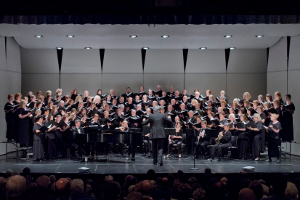Concerts by the Ciompi Quartet are presented at Duke University by Duke Performances, which at its website refers to the ensemble as “staggeringly talented” – a description with which its long-time fans would likely agree. We are blessed to have numerous chamber ensembles playing here, both resident and visiting, but there’s really only one important quartet, and the Ciompi is it. Since 1965, this group has methodically and progressively enriched our lives, locally. The musicians’ commitment to building the repertory is particularly noteworthy – every season, there are new works by living composers, some of which may stand a chance of being the “classic” music of the future. But even when the Ciompi Quartet revisits mainstream works – music that is today considered “classic” – there’s always something new and refreshing in the group’s carefully considered preparations and performances. At the first concert of the 2011-12 season, given in the Ernest W. Nelson Music Room, the players – violinists Eric Pritchard and Hsiao-mei Ku, violist Jonathan Bagg, and cellist Fred Raimi – infused works by Haydn, Shostakovich, and Dvorák with vibrant life, illuminating some relatively familiar scores and brightening both the venue and the substantial audience that turned out to hear and celebrate “our” quartet as it begins its 47th season.
This year, the ensemble celebrates Haydn and Shostakovich, offering two-thirds of the former’s Op. 20 quartets and launching a long-term survey of the latter’s fifteen scores for string quartet. In a short program note, Fred Raimi writes that, at the rate of two a year, it will take ’em till 2018 to get through the Shostakovich. The CQ has been playing Haydn for quite a while already – starting over, and progressing at the rate of two a year, it would tie ’em up for 34 years, or until 2045! We should rejoice at this ensemble’s advocacy, particularly since these are such outstanding Haydn players. The Quartet in E-Flat, Op. 20, No. 1, which is listed as No. 28 in most catalogs, is a rock-solid score from the pen of an already confirmed master, and the performance it received on this occasion was, well, masterful, too. There were all the customary Ciompi hallmarks – incisiveness, crisp attacks and releases, immaculate phrasing, heartfelt projection of emotion. What’s not to like?
Shostakovich’s String Quartet No. 1 is, as Raimi reminded us, the Russian master’s only pre-war quartet (pre-WWII, that is). It’s generally bright and buoyant, generally redolent with sunshine, and generally engaging, even at first hearing (or when revisited after, say, a long absence). It’s music that appeals intellectually and to the heart, and the performance was superb. There’s more poignancy in the opening movement than one might have expected, although perhaps we color our perceptions based on what we know is yet to come as the survey progresses. Raimi makes note of the rollicking scherzo and finale, saying they may suggest a drunken sailor, an apt simile although few inebriated mariners on shore leave are as light on their feet as these artists were in these movements!
This concert, which began with the first quartet of Haydn’s Op. 20 and the first quartet of Shostakovich, ended with the last quartet of Dvorák – the Quartet No. 14, in A-flat, Op. 105. It’s an amazing work, one that in many respects revisits the composer’s entire career. It’s full of animated folk (or folk-like) tunes, often featuring the ensemble’s inner and lowest voices. It broadens (as Raimi again so astutely mentions, in his notes) to embrace almost Brahmsian compositional qualities (while avoiding any of that composer’s thickness). And it appeals to the heart, even more than to the mind – evoking in its hearers feelings of warmth and contentment that remind us that all is at root ok with the world – at least while the Ciompi Quartet is playing Dvorák. For those moments, then, everything else can wait. After a long summer without these artists, it’s good to have our quartet back in harness again!
Note: The ensemble’s lunchtime concert series moves this year to the Gothic Room of Perkins Library on the West Campus where, at noon on September 27, the Haydn and Shostakovich will be repeated. Those who missed this Nelson Music Room concert are particularly urged to attend the Gothic Room repeat. For details, see the sidebar.











